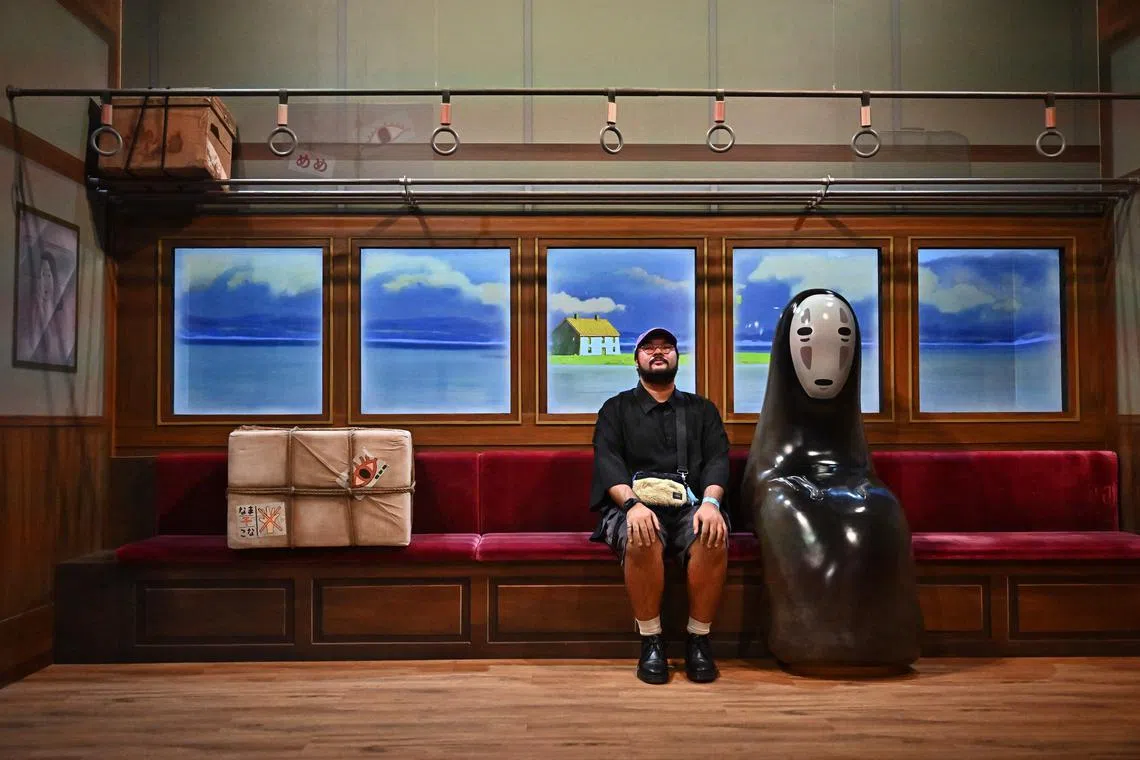Commentary
Is this the end for Japan’s iconic Studio Ghibli?
Sign up now: Get ST's newsletters delivered to your inbox

A man sits next to the character No Face from the Studio Ghibli movie Spirited Away in The World of Studio Ghibli's Animation Exhibition Bangkok.
PHOTO: AFP
TOKYO – In the end, even the most iconic of Japanese artisans have to bow to demographics.
The announcement that Studio Ghibli, the famed animation studio responsible for My Neighbour Totoro and Spirited Away, will be acquired by broadcaster Nippon Television Holdings
For a company that famously eschews profit, the latest technology and even the trappings of modern society itself, to in effect sell out to one of the country’s big four TV networks came as a total shock.
It is tough to find an appropriate analogy; the only one that comes close is Walt Disney’s purchase of Pixar for US$7.4 billion (S$10.1 billion) in stock in 2006.
Even that fails to capture the significance; the computer animation firm, which at the time was controlled by Mr Steve Jobs, had been on the scene for only a decade.
Studio Ghibli connects almost every generation now alive in Japan; parents who showed their kids Nausicaa Of The Valley Of The Wind in the 1980s are now grandparents.
Fans will rightly be nervous. It is not just a business: its dedication to monozukuri, the Japanese art of craftmanship in the pursuit of perfection, is the stuff of legend.
Outgoing president and co-founder Toshio Suzuki has written books with such titles as The Philosophy Of Ghibli and The Thinking Of Geniuses.
The studio reportedly animates no more than one minute of a movie a month.
Now, it will be a unit of a listed company, one that has seen revenue plateau for the past seven years and is facing a declining audience: not just with the country’s ageing population, but with half of Japanese Gen Z-ers saying they do not watch TV at all.
Japanese broadcasters are hardly known for their brave artistic choices, and the spectre of Mr Suzuki being replaced as president by Nippon TV veteran and former varsity rugby player Hiroyuki Fukuda will unsettle many, no matter how much the companies say the broadcaster will preserve Ghibli’s culture.
But what the studio does not have is time – an issue faced by many Japanese companies, particularly smaller outfits like Ghibli, which has just 190 full-time employees.
“Director Hayao Miyazaki is now 82 years old, and producer Suzuki is 75,” a press release from the two firms stated, referring to the famed director of its biggest hits. “The problem of succession has been a longstanding concern for Studio Ghibli.”
Mr Miyazaki’s eldest son, Mr Goro Miyazaki, had long been expected to take over, but as with many iconic firms, it was not to be: his son believed he could not manage it by himself and said the firm should look elsewhere.
The sale might then have lessons for many Japan firms with household-name leaders who struggle to shake their key-man risk.
That includes SoftBank Group, where Mr Masayoshi Son has frustrated several would-be successors by his insistence to stay; or electric-motor giant Nidec, where billionaire founder Shigenobu Nagamori appointed five executive vice-presidents, one of whom will take the big job next April in an arrangement more akin to a reality show.
Uniqlo owner Fast Retailing has struggled to replace founder Tadashi Yanai, Japan’s richest man. Will these firms also end up selling under the pressure of replacing a legendary founder?
A key reason Nippon TV is in a position to buy it at all is the longstanding relationship between the two firms.
The broadcaster has for decades shown Ghibli movies as part of its Friday Road Show weekly movie slot, still frequently one of the best-watched segments of TV.
Even as audiences decline overall, Mr Miyazaki’s biggest hits still draw so many viewers. It is speculated to be one reason Japan is the only major market where its movies are not available on a streaming service.
Ghibli, of course, has a notoriously poor relationship with Disney, which distributed its movies for years.
That makes it interesting to note Nippon TV formed a strategic partnership with Disney in 2022, offering a bundle of Hulu and Disney+ and allying on productions.
It also owns its own streaming service, having bought out Hulu’s Japan business in 2014 before Disney took control.
If there are plans for streaming or expanding the intellectual property treasure trove, the broadcaster is not saying.
The story for now is that it will hold the reins of management so that Ghibli can concentrate on film-making; Nippon TV is pledging to respect the smaller company’s “autonomy”.
Nonetheless, between this – and the relatively tepid response to the latest and possibly last Miyazaki movie, The Boy And The Heron, which so far has grossed just half what 2008’s Ponyo took in – it is hard not to think this might be the end of an era for one of cinema’s last great auteurs.
Ghibli movies often come with life lessons – creators and business leaders alike might learn some from this purchase. BLOOMBERG


